The AMD Zen and Ryzen 7 Review: A Deep Dive on 1800X, 1700X and 1700
by Ian Cutress on March 2, 2017 9:00 AM ESTBenchmarking Performance: CPU Encoding Tests
One of the interesting elements on modern processors is encoding performance. This includes encryption/decryption, as well as video transcoding from one video format to another. In the encrypt/decrypt scenario, this remains pertinent to on-the-fly encryption of sensitive data - a process by which more modern devices are leaning to for software security. Video transcoding as a tool to adjust the quality, file size and resolution of a video file has boomed in recent years, such as providing the optimum video for devices before consumption, or for game streamers who are wanting to upload the output from their video camera in real-time. As we move into live 3D video, this task will only get more strenuous, and it turns out that the performance of certain algorithms is a function of the input/output of the content.
7-Zip
One of the freeware compression tools that offers good scaling performance between processors is 7-Zip. It runs under an open-source licence, is fast, and easy to use tool for power users. We run the benchmark mode via the command line for four loops and take the output score.
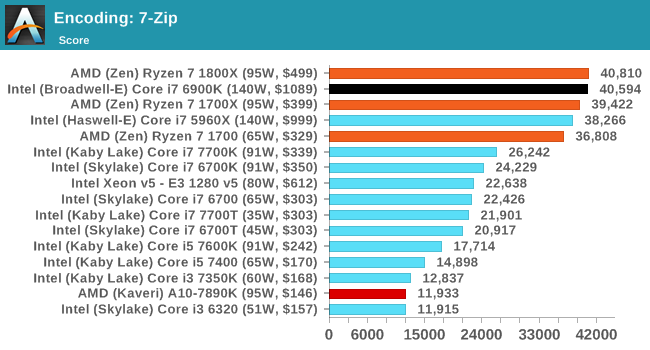
WinRAR 5.40
For the 2017 test suite, we move to the latest version of WinRAR in our compression test. WinRAR in some quarters is more user friendly that 7-Zip, hence its inclusion. Rather than use a benchmark mode as we did with 7-Zip, here we take a set of files representative of a generic stack (33 video files in 1.37 GB, 2834 smaller website files in 370 folders in 150 MB) of compressible and incompressible formats. The results shown are the time taken to encode the file. Due to DRAM caching, we run the test 10 times and take the average of the last five runs when the benchmark is in a steady state.
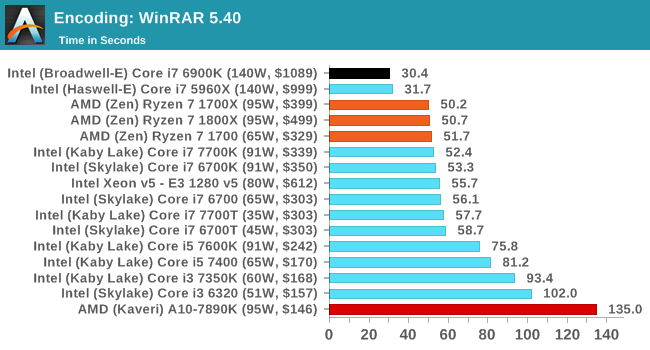
AES Encoding
Algorithms using AES coding have spread far and wide as a ubiquitous tool for encryption. Again, this is another CPU limited test, and modern CPUs have special AES pathways to accelerate their performance. We often see scaling in both frequency and cores with this benchmark. We use the latest version of TrueCrypt and run its benchmark mode over 1GB of in-DRAM data. Results shown are the GB/s average of encryption and decryption.
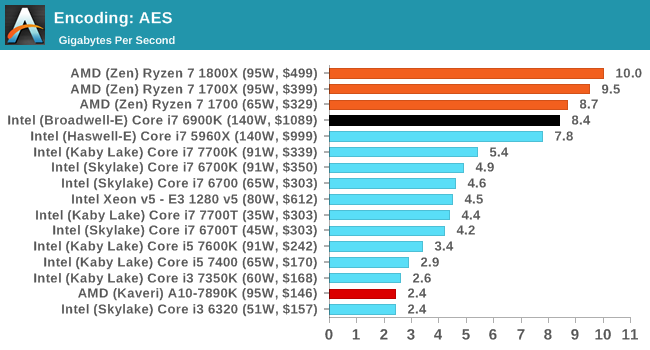
HandBrake H264 and HEVC
As mentioned above, video transcoding (both encode and decode) is a hot topic in performance metrics as more and more content is being created. First consideration is the standard in which the video is encoded, which can be lossless or lossy, trade performance for file-size, trade quality for file-size, or all of the above can increase encoding rates to help accelerate decoding rates. Alongside Google's favorite codec, VP9, there are two others that are taking hold: H264, the older codec, is practically everywhere and is designed to be optimized for 1080p video, and HEVC (or H265) that is aimed to provide the same quality as H264 but at a lower file-size (or better quality for the same size). HEVC is important as 4K is streamed over the air, meaning less bits need to be transferred for the same quality content.
Handbrake is a favored tool for transcoding, and so our test regime takes care of three areas.
Low Quality/Resolution H264: He we transcode a 640x266 H264 rip of a 2 hour film, and change the encoding from Main profile to High profile, using the very-fast preset.
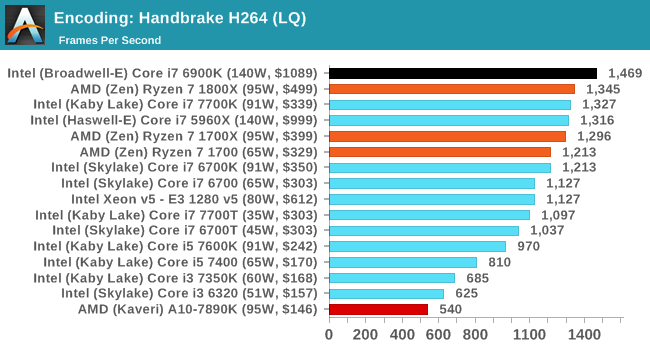
High Quality/Resolution H264: A similar test, but this time we take a ten-minute double 4K (3840x4320) file running at 60 Hz and transcode from Main to High, using the very-fast preset.
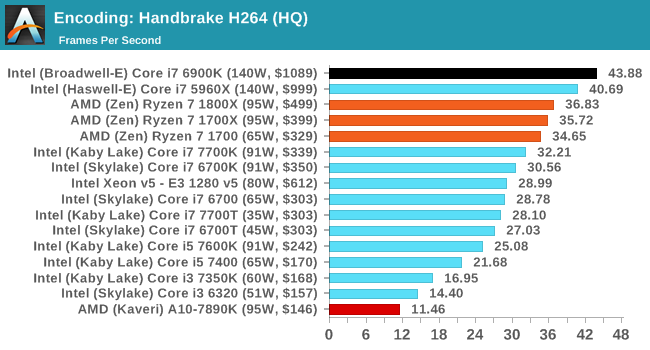
HEVC Test: Using the same video in HQ, we change the resolution and codec of the original video from 4K60 in H264 into 1080p30 HEVC. This causes a dramatic reduction in filesize.
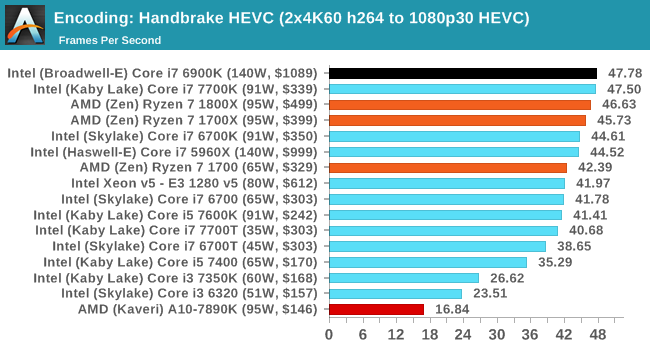










574 Comments
View All Comments
BurntMyBacon - Friday, March 3, 2017 - link
@ShieTar: "Well, the point of low-resolution testing is, that at normal resolutions you will always be GPU-restricted."If this statement is accepted as true, then by deduction, for people playing at normal (or high) resolutions, gaming is not a differentiator and therefore unimportant to the CPU selection process. If gaming is your only criteria for CPU selection, then that means you can get the cheapest CPU possible until you are not GPU restricted.
@ShieTar: "The most interesting question will be how Ryzen performs on those few modern games which manage to be CPU-restricted even in relevant resolutions, e.g. Battlefield 1 Multiplayer."
I agree here fully. Show CPU heavy titles to tease out the difference between CPUs. Artificially low resolutions are academic at best. That said, according to Steam Surveys, just over half of their respondents are playing at resolutions less than 1080P. Over a third are playing at 1366x768 or less. Though, I suspect the overlap between people playing at these resolutions and people using high end processors is pretty small.
Average frame rate is fairly uninteresting in most games for high end CPUs, due to being GPU bound or using unrealistic settings. Some, more interesting, metrics are min frame rate, frame time distribution (or simply graph it), frame time consistency, and similar. These metrics do more to show how different CPUs will change the experience for the player in a configuration the player is more likely to use.
Lord-Bryan - Thursday, March 2, 2017 - link
Who buys a 500 dollar cpu to play games at 720p res. All that talk is just BS.JMB1897 - Friday, March 3, 2017 - link
That test is not done for real world testing reasons. At that low resolution, you're not GPU bound, you're CPU bound. That's why the test exists.Now advance a few years into the future when you still have your $500 Ryzen 7 CPU and a brand new GPU - you may suddenly become CPU bound even at QHD or 4k, whereas a 7700k might not quite be CPU bound just yet.
MAC001010 - Saturday, March 4, 2017 - link
Or a few years in the future (when you get your new GPU) you find that games have become more demanding but better multi-threaded, in which case your Ryzen 7 CPU works fine and the 7700k has become a bottleneck despite its high single-threaded performance.This illustrates the inherent difficulty of comparing high freq. CPUs to high core count CPUs in regards to future potential performance.
cmdrdredd - Saturday, March 4, 2017 - link
"Or a few years in the future (when you get your new GPU) you find that games have become more demanding but better multi-threaded, in which case your Ryzen 7 CPU works fine and the 7700k has become a bottleneck despite its high single-threaded performance."Maybe, the overclocking scenario is also important. Most gamers will overclock to get a bit of a boost. I have yet to replace my 4.5Ghz 3570k even though new CPUs offer more raw performance, the need hasn't been there yet.
One other interesting thing is how Microsoft's PlayReady 3.0 will be supported for 4k HDR video content protection. So far I know Kaby Lake supports it, but haven't heard about any of AMD's offerings unless I missed it somewhere.
Cooe - Sunday, February 28, 2021 - link
Lol, except here in reality the EXACT OPPOSITE thing happened. A 6-core/12-thread Ryzen 5 1600 still holds up GREAT in modern titles/game engines thanks to the massive advantage in extra CPU threads. A 4c/4t i5-7600K otoh? Nowadays it performs absolutely freaking TERRIBLY!!!basha - Thursday, March 2, 2017 - link
all the reviews i read are using NVidia 1080 gfx card. my understanding is AMD graphics has better implementation of DX12 with ability to use multiple cores. I would like to see benchmarks with something like RX480 crosfire with 1700x. this would be in the similar budget as i7 7700 + GTX 1080.Notmyusualid - Friday, March 3, 2017 - link
http://www.gamersnexus.net/hwreviews/2822-amd-ryze...cmdrdredd - Saturday, March 4, 2017 - link
Overclocking will be interesting. I don't use my PC for much besides gaming and lately it hasn't been a lot of that either due to lack of compelling titles. However, I would still be interested in seeing what it can offer here too for whenever I finally break down and decide I need to replace my 3570k @ 4.5Ghz.Midwayman - Thursday, March 2, 2017 - link
Here's hoping the 1600x hits the same gaming benches as the 1800x when OC'd. $500 for the 1800x is fine, Its just not the best value for gaming. Just like the i5's having been better value gaming systems in the past.